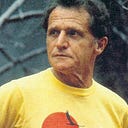Long Live the King
Oct. 25, 2020 — On October 21st, 1964, the history was made. Ethiopia’s Abebe Bikila won the Tokyo Olympics Marathon in the world best time of 2:12:11. Japanese people love marathon. To them , any distance longer than 1km is “marathon”. I remember running school “marathon”, the distance of 2km, in elementary school. And the way Abebe defended his Olympic marathon title for the second time — never been accomplished before — burnt in the memory of millions of Japanese people on that autumn day through Koshu-Kaido street, heading out west of Tokyo from Yoyogi National Stadium. Abebe had an apendictomy mere 5 weeks before the Games. Even the legendary runner, Emil Zatopek, said it cannot be done. “Nobody can win the Olympic marathon twice,” he said. As the gun went, Abebe started dead last. By 5k, he caught up with the lead group that included the world 10k record holder, Ron Clarke. At 15k, Abebe took the lead. And the race was over. The rest of the race was Abebe’s time trial. The way he looked down a bit, with his mouth slightly open…. Later, the Japanese newspaper called him “running seeker”. No emotion…. Total concentration…. Full of dynamism, yet, the quiet beauty of stoicism of Abebe’s running was beautifully captured in the documentary film by Kon Ichikawa, “The Olympiad”. The Self-Made Olympian, Minnesota’s Ron Daws said watching this video clip at the Olympic Center before 1968 Olympics was the most inspirational experience. The “Barefoot King”, this time in a pair of white Puma shoes, won the Olympic marathon gold medal, again in the world fastest time as he did 4 years ago, seemingly easily. At the finish, he started calisthenic exercises and said, if necessary, he could continue another 20km.
Four years earlier, at Rome Olympics where Lydiard’s name became synonym to “modern distance running training revolution,” the marathon was contested through ancient Appian Road into the darkness of the summer evening. Before Lydiard’s mission was completed (see HERE for detail) with Magee’s bronze medal, Ethiopia’s unknown 25-year-old soldier ran through the entire cobble stone street of Rome without shoes, and brought the first ever Olympic gold medal to the country of East Africa. That was the beginning of Abebe’s legend (HERE is the race clip). Abebe was unbeaten, except for the cold snowy Boston marathon in 1963 where he finished 5th. Going into 1968 Mexico City Olympics, people thought he might pull through once again…. He stopped and left the course at 16km. And that was the end of Abebe legend. He was unbeaten, we all thought he was even immortal!! Abebe never ran another marathon again. Furthermore, in March of 1969, Abebe had a car accident and became paralyzed waist down. The marathon king would not spend the rest of his life on a wheelchair. But as the man with indomitable spirit, Abebe participated Paralympic, first in archery and then a dog sledding in the winter games. He won his third gold medal in Paralympic in 1971 in a dog sledding in Norway.
Many runners, as was Ron Daws, think of Abebe as their running hero. His monk-like expression; and his total dominating-fashion in the race would grab our heart and spirit. Black-and-white images of this stoic “running seeker” can be seen all over the place. I remember, when I was in the junior high school and I was about to head to school for the end-of-the-term exam. At the breakfast table, I opened the newspaper and saw this image. “ABEBE BIKILA DIED” it read. It was October 25th, 1973; forty-seven years ago today. He was only 41-years-old. The cause was the bleeding in his brain, most likely the after-effect of the car accident 4 years earlier. Perhaps there has not been any other runner who captured our wildest imagination as Abebe Bikila did. “He was just majestic,” Barry Magee who stood on the medal podium with Abebe at Rome Olympics recalls. “The bearing (Abebe) had; he walked like a king, he acted like a king…. And his performance — world record by 2-minutes — was just incredible!!” So here’s to the King of Marathon, Abebe Bikila, on the anniversary day of his passing; may he Rest In Peace; and Long Live the King… If nothing else, at least his memories and the Legend!! — Nobby Hashizume
